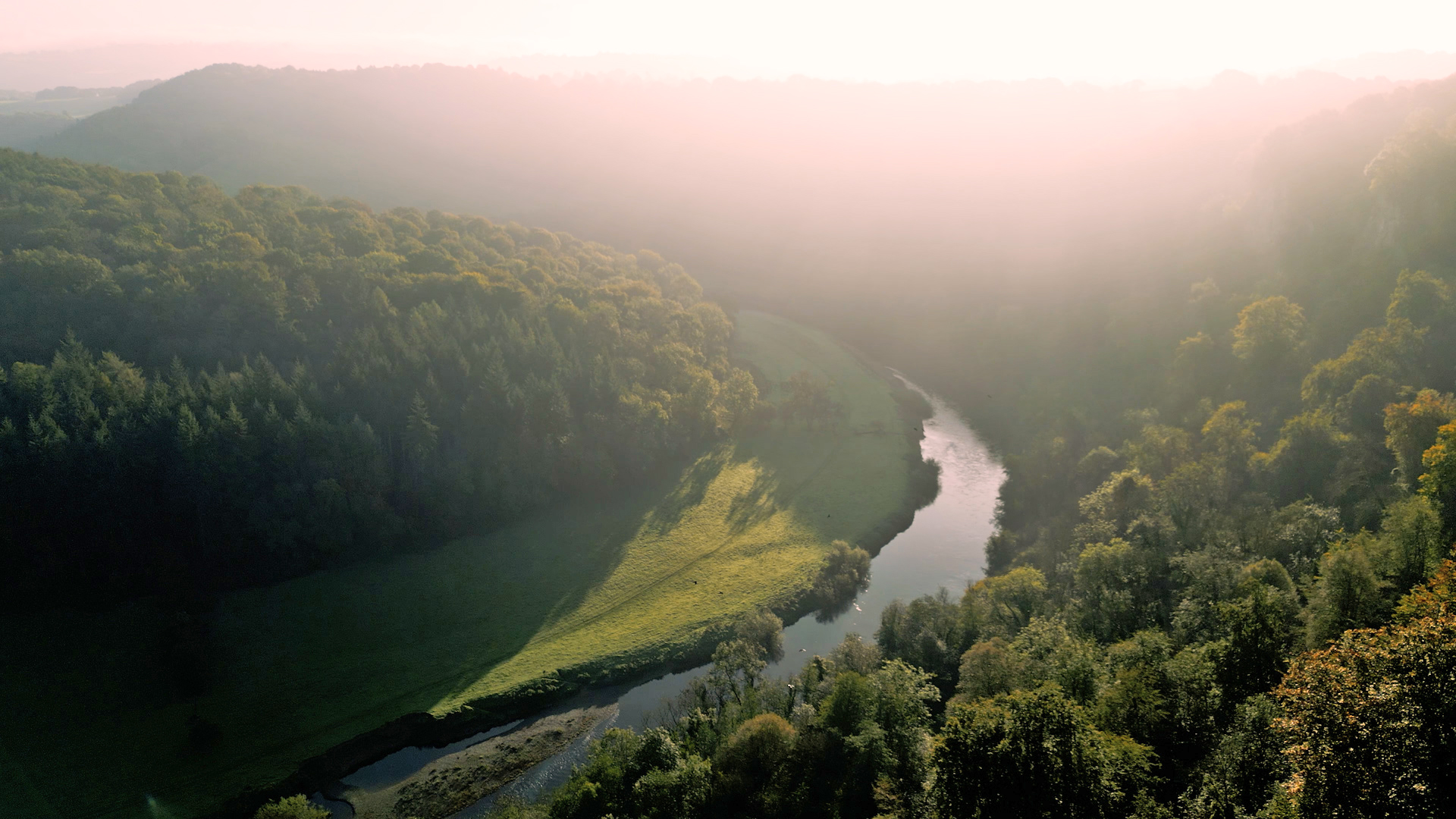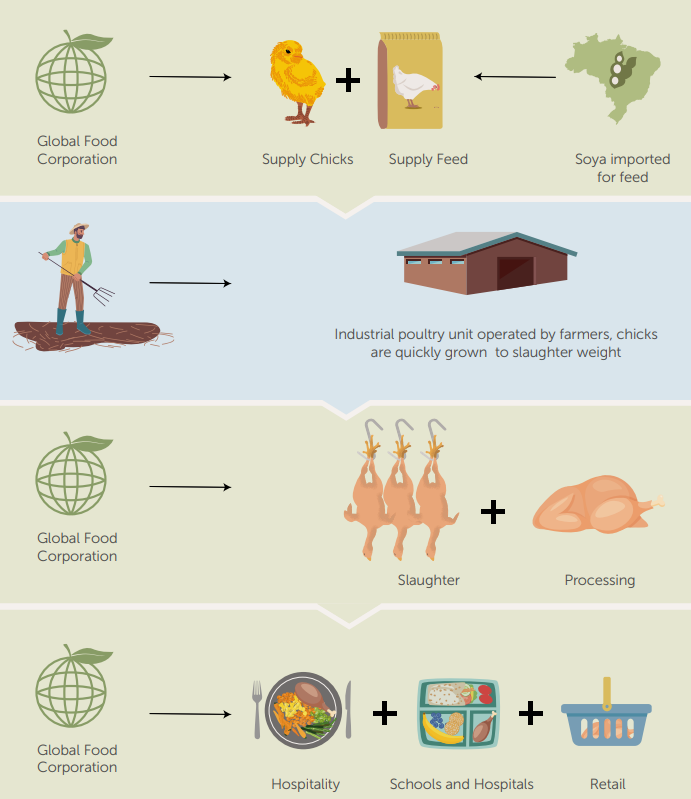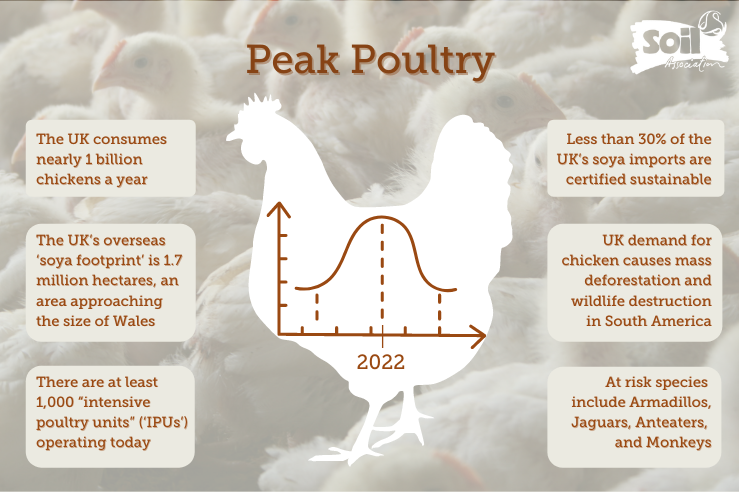
- Soil Association
- Causes and campaigns
- Stop killing our rivers
- Who is responsible for all those chickens?

Who is responsible for all those chickens?
Global food businesses are at the heart of UK chicken farming
Avara Foods is owned by Cargill, the largest privately owned company in the US by revenue. Cargill say that ‘Together with farmers, customers, governments and communities, we help people thrive.’ However, their actions in the Wye catchment show that this isn’t really the case.
Global food companies are at the heart of chicken farming in the UK. Out of over 20 million chickens raised each year in the Wye catchment, 16 million are produced under contract to Avara Foods. This huge company supplies chicken to retail, restaurants, schools, and hospitals.
Every week, Avara processes two million chickens at its factory in Hereford, supplied by 120 poultry farms in the Wye catchment. They’re also Tesco’s main fresh chicken supplier, processing 4.5 million chickens for them on a weekly basis.
Retailers also play a big role
In 2013, Cargill and Tesco signed a contract - and £35 million was poured into expanding Cargill’s chicken operation in Hereford. This move supercharged the already booming chicken industry, causing a spike in chicken farms in Herefordshire and Shropshire, and leading to the environmental problems we're dealing with now. Back then, Cargill was already facing lawsuits in Oklahoma, USA, because their chicken farms were polluting rivers.
Companies like Avara control almost all aspects of intensive chicken production. Whilst the farmers raise the chickens on their farms under contract, it's the food companies that provide the chicks and feed, slaughter the birds, process them and sell the meat. After the chickens are slaughtered, in just 30-40 days, their living area and manure are cleaned up and sent for disposal.
The feed supply for the poultry industry works in a similar way - chicken feed like soya is provided by companies like Cargill (them again)!

The supply chain: farmers raise chickens via contract, companies provide chicks and feed, and then slaughter and process the birds and sell the meat
Chicken feed production damages overseas ecosystems
The UK uses nearly 2 million tonnes of soybeans a year to feed livestock. More than half is used in intensive chicken production. Most of this ‘high protein’ soya, which is needed for fast-growing chicken breeds, is grown in Brazil. It’s produced using phosphate fertilisers and highly hazardous pesticides, linked to an increase in childhood cancers.
A lot of this soya is grown in sensitive ecosystems, like the Cerrado savannah, the most biodiverse grassland in the world. The Cerrado is home to thousands of plants and animals found nowhere else.
Cheap feed and cheap chicken go hand in hand. While consumer demand for cheap chicken has risen, increased production has also been encouraged by big corporations who need a place to sell their intensive crops. The same global companies are very often controlling both the soya crops used for chicken feed, as well as the chicken production.
Agrochemical companies, grain traders, and the ‘factory farmed’ livestock sector all work together – and are often controlled by the same companies – to continue this damaging industry. Intensive poultry production plunders overseas ecosystems and destroys natural environments closer to home.
Chicken manure is full of phosphate – and that’s a problem
Huge numbers of chickens mean huge amounts of manure, and disposing of it isn’t easy. In the Wye, and likely in other river catchments, where these units are also concentrated, disposal usually means spreading the manure on the land as fertiliser. This risks ongoing pollution, algal blooms and threatens natural wildlife.
Avara’s ‘solution’
In January 2023, Avara pledged that by 2025, its supply chain would stop contributing to excess phosphate in the River Wye by shipping more of it out of the area to be anaerobically digested.
In August 2023, they announced that poultry manure from Avara’s supply chain would no longer be available for sale as fertiliser in the River Wye catchment. In December, they confirmed it could not be used in a way that will contribute to excess nitrogen or phosphate levels.
But where will the manure from the millions of chickens in the catchment go? How will the pollution risks be managed? Shipping manure out of the catchment could just shift the problem to other parts of the country. This would present a risk to other river systems, which may already be affected by phosphate pollution.
It's also not clear how the transport of the manure will be done, nor how sustainable it will be. Think Tank Onward have suggested government funding for poultry farmers to convert manure into fertiliser pellets that are easy to transport - but this is an expensive process.
Avara have said very little about these details. They haven’t said how they will address the excessive levels of phosphate already in the Wye and the soils around it, which they are, at least in part, responsible for.
Is there a way to manage the impacts of chicken farm pollution?
Even with action from a big industry player, it could be too late to save the Wye from the worst of phosphate pollution. Avara themselves have admitted that their actions will have little impact if others don’t also step up.
Quite simply, there are too many chickens and too much manure to be sustainable. We need to reduce chicken numbers now and reach ‘peak poultry’ in 2024.
-
Stop killing our rivers
Help us save our rivers from the impact of industrial poultry farming. Read more about our Stop Killing Our Rivers campaign and sign our petition.
Read more
Stop killing our rivers


